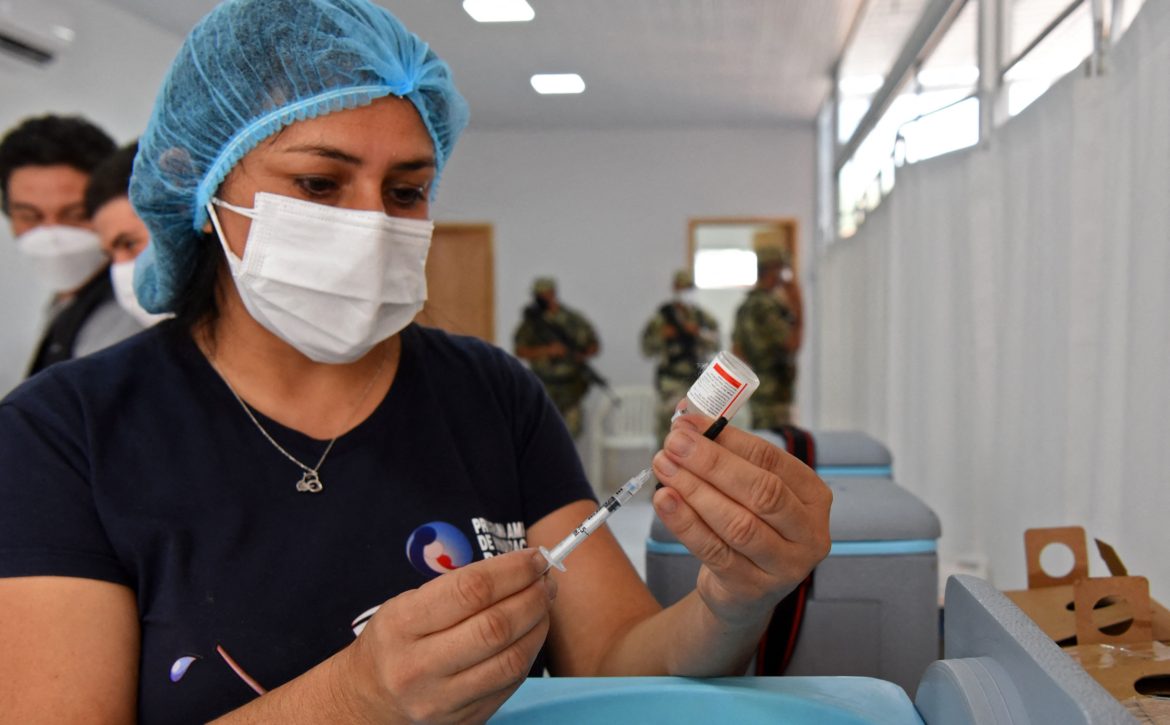
Let Other Countries Copy the Covid Vaccines
There’s one big thing the Biden administration could do to beat back the global pandemic: urge the World Trade Organization to waive patent protections on Covid-19 vaccines. To date, it hasn’t done that, despite calls from India, South Africa, and 100 other mainly low- and middle-income countries represented in the WTO. Instead, protections for patent-holders in the Trade-Related Aspects of Intellectual Property Rights Agreement, or TRIPS, prevent such countries from manufacturing the vaccines developed by Moderna and Pfizer, among others, and which are now being administered to the populations of wealthier nations.Polling released Thursday morning, however—conducted by Data for Progress on behalf of the Progressive International, which brings together left-leaning movements and thinkers from around the world—finds that a majority of people in the United States support waiving patent protections on the vaccines. As WTO signatory nations prepare to gather and discuss such demands on May 5, the administration will now have to decide whether it stands with its constituents and lower-income countries worldwide or with pharmaceutical companies.Sixty percent of likely voters want President Biden to support calls for a TRIPS suspension from low- and middle-income countries at the WTO, according to the new poll, including 72 percent of registered Democrats and 50 percent of registered Republicans. Thirty-six percent of Republicans polled disagree, compared with just 28 percent of likely voters overall. Nearly 40 percent of vaccines administered so far have been distributed in 27 wealthy nations that represent just 11 percent of the world’s population. Many poor and middle-income countries may not have the required vaccination rates for herd immunity until 2024. Just 1 percent of Africans have been vaccinated, compared with 36 percent of North Americans and 22 percent of Europeans. The WHO has endorsed lifting patent protections, as well, in line with calls for a free and universally accessible “people’s vaccine” that reflects the ample public-sector funding that has created the vaccines. Nearly 100 members of the U.S. House of Representatives have reportedly signed on to a letter urging the administration to support a waiver, joined by Bernie Sanders and Elizabeth Warren in the Senate.“This virus does not respect borders,” Sanders said in an emailed press statement. “The bottom line is, the faster we help vaccinate the global population, the safer we will all be. That should be our number one priority, not maximizing the profits of pharmaceutical companies and their shareholders.”In advance of the WTO General Council meeting next month, U.S. Trade Representative Katherine Tai has been meeting with both drugmakers and waiver advocates. While she reportedly committed to “increasing the production and distribution of vaccines,” she hasn’t signaled any clear intention as of yet that the U.S. will change its position on patents in the WTO. In addition to members of Congress, 175 former, hardly left-wing world leaders and Nobel laureates are urging the White House to do just that, calling a WTO waiver “a vital and necessary step to bringing an end to this pandemic. It must be combined with ensuring vaccine knowhow and technology is shared openly.” Officially, the Office of the U.S. Trade Representative is still “evaluating the efficacy of this specific proposal by its true potential to save lives.”There are some signals the administration may be warming to the idea. In remarks to a virtual conference on vaccine equity Wednesday, Tai acknowledged that “there are many aspects of the institution of the WTO and its rules that have not adapted to a changed world.… We hope to hear more today about how the market once again has failed in meeting the health needs of developing countries.” As Alexander Zaitchik detailed for The New Republic this month, billionaire Bill Gates has been instrumental in the push to place patent protections on Covid-19 vaccines, acting against efforts by the WHO to get companies and governments to pool intellectual property related to novel coronavirus vaccines and treatments to speed global pandemic response. Gates’s patent-friendly alternative has failed to meet even its modest goal for access, which was defined as vaccinating just one-fifth of populations in participating low- and middle-income countries. The track record for private property rights enabling a speedy response to diseases is dismal. As Zaitchik notes, public pressure in the 1990s eventually forced the Clinton administration to drop its high-profile campaign in support of a lawsuit from pharmaceutical companies looking to block global south countries—then gripped by a horrific HIV/AIDS epidemic—from producing cheap, generic antiretroviral drugs that were by that point widespread in the U.S. Though companies can now produce generic versions of vaccines under compulsory licensing agreements, developing countries have been reticent to do so—including during this pandemic—for fear of diplomatic blowback. “Historically, the U.S. has always threatened countries that have used it,” Nobel laureate Joseph Stiglitz told the Financial Times. “So we’ve agreed to it, but we undermine it.”As is worth reiterating, the case for lifting patent protections in the Covid crisis is particularly strong. As long as large populations remain unvaccinated, the virus will keep evolving, raising the likelihood that variants will emerge against which current vaccines are less effective. Aside from being the right thing to do, vaccinating everyone as quickly as possible is in everyone’s best interest.There’s a startlingly close parallel when it comes to the climate crisis, as well. Low- and middle-income countries vulnerable to climate change have long seen intellectual property as a key barrier to scaling up clean energy. Allowing companies to hoard patents—and charge extortionate rents for the right to produce life-saving green technology—stands to slow down a global energy transition and potentially empower a new class of patent holders to dole out green energy only to those who can afford it. Emissions, meanwhile, will keep rising. Whether on vaccines or batteries for electric cars, rules designed to protect the profits of the few tend to come at the expense of the many.
Read More


